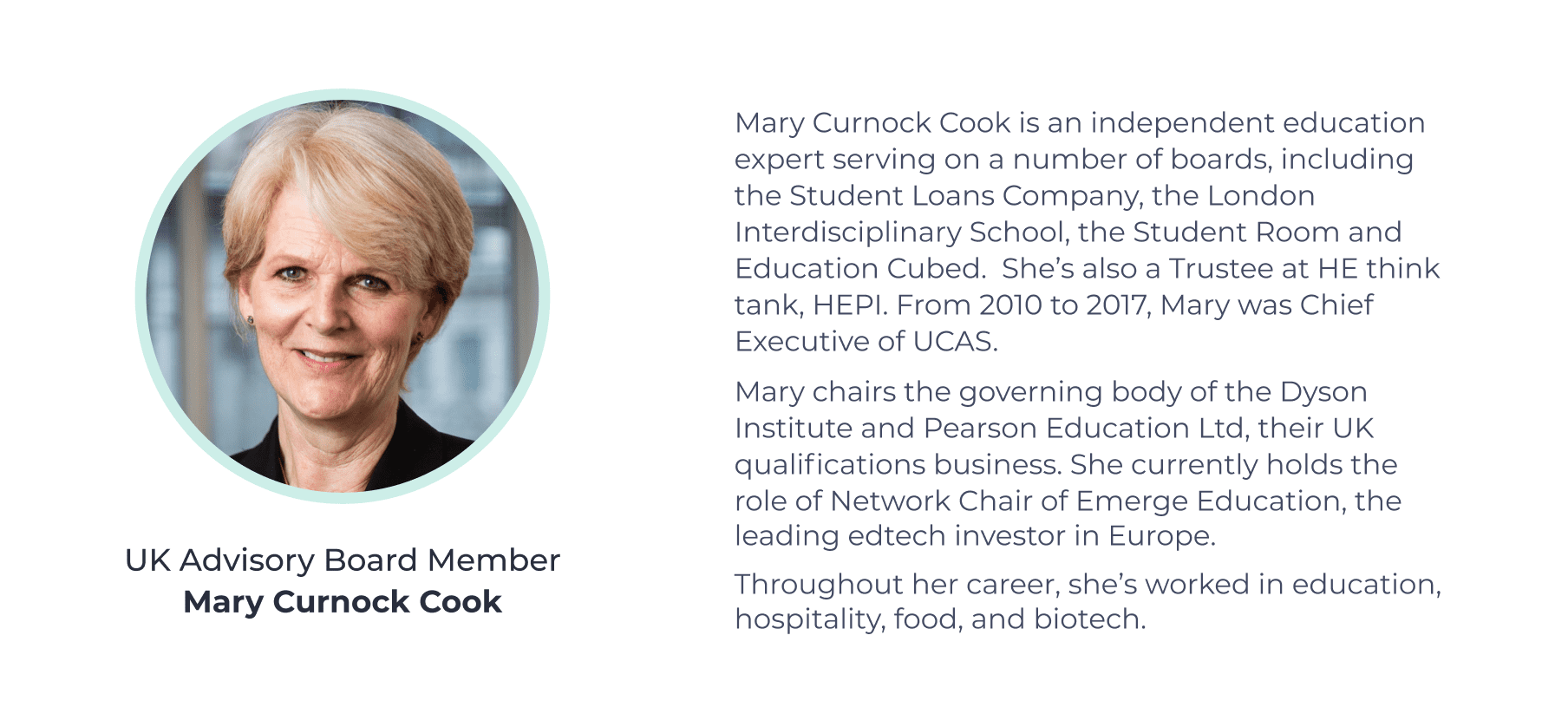As the international education industry marches through its biggest year yet, we wanted to examine how EdTech has helped drive the substantial growth seen over the last 10+ years. We often crunch data to answer questions, but last week we decided to lean on the experience of an industry expert.
We sat down with ApplyBoard UK Advisory Board Member Mary Curnock Cook to get a top-down view of how EdTech has impacted the evolution of international education. We discussed how the perception of EdTech has shifted, EdTech’s role in pandemic recovery, and gaps in the market that EdTech needs to address.

Two years ago, when COVID hit, a lot of people in EdTech were unsure how the wider sector would be impacted. Today, with applications pouring into all of the major study abroad destinations, it looks like international education is poised to have its biggest year yet. What role do you think EdTech played throughout the pandemic to get international education to the strong place where it is today?
Mary Curnock Cook: Universities in the UK are still quite traditional. Sometimes you can walk into an institution and almost feel as if you’re in a different century. What the pandemic did was force universities to use technology in ways they might have been toying with but never fully committed to.
Schools suddenly had to think about how they could maintain the quality of teaching and learning without having students and instructors in the same room. The knock-on effect was realizing that they didn’t have the ideal technology infrastructure to do innovative things. The pandemic exposed some gaps in the technology infrastructure of many UK universities, not just from a teaching standpoint, but also within student support and administration.
It’s been a bit of a wake-up call, I think. I convene a group of senior higher ed execs to talk about EdTech on a termly basis and we’ve never seen so much engagement and interest in joining our conversations.
UK universities are realizing that their technology stack, which still includes a lot of legacy technology—on-campus data centres, and siloed architecture, for example—needs to be updated. Schools are coming to an understanding that the transformation to modern platform architecture is essential to ensure they can take advantage of all the EdTech products and services that are available to them.
ApplyBoard’s UK Advisory Board features several of the UK’s most distinguished higher education professionals. Collectively, this team helps to support ApplyBoard’s growth and innovation across the UK.
At ApplyBoard, we’re really excited about some of the innovations we’ve been working on that can help us better serve our students. But our sector is full of innovation right now. What are some of the innovations in EdTech that you’re most excited about?
Mary Curnock Cook: I’m most interested in enhancements to learning and teaching. We’ve had a debate in the UK about the necessity of face-to-face learning all the time. Students showed an appreciation for the online learning resources that stemmed from the pandemic and wanted access to those resources even after campuses reopened. There’s a much more sophisticated conversation going on now about how we can use technology to enhance the student experience.
The meat and potatoes of what universities do is teach students in a way that allows them to learn effectively while also enjoying themselves.
One area where schools need help is funding. We haven’t had a tuition increase per domestic student since 2012 which is a problem being compounded by high inflation. There’s a clear need for cost efficiencies within the British higher education sector. EdTech has a big opportunity to help institutions maximize efficiency. That’s what I’m excited about. Innovations that help schools allocate more of their resources towards students and save money in the process.
In a recent publication for HEPI, Mary wrote about UK policy changes that could increase higher education access for students from disadvantaged backgrounds.
International students have expressed a strong desire to return to campus and participate in in-person learning. What would you say to those who suggest that tech is more beneficial to domestic students than international ones?
Mary Curnock Cook: International students want to be on campus and experience the culture of a new country, but that doesn’t mean they won’t also benefit from digital tools that can help them learn better.
This is particularly important for students who have English as a second language. For most of these students, this is the first time they’re being taught entirely in English. So the processing time for inputs through lectures might be slightly different, even for the students with stronger English. Something as simple as being able to watch back a recording can be even more valuable for international students.
So I don’t think it’s either or, it’s both and. The smart universities are the ones understanding we’re in this new world when younger students don’t need to make a distinction between hybrid and in-person. Their life is already a blend of digital and analog interactions, so at school the two blend together almost seamlessly.
Do you see any gaps in the market that EdTech organizations could look to address right now? What are some of the issues students are facing that they need more help to overcome? How could EdTech help?
Mary Curnock Cook: The one area that’s not really being given attention to is employability. For our domestic students, unis are all over the idea that students are attending university in the UK to attain a degree that will help them get a job they love and put them on a good career path. We probably haven’t paid enough attention to the fact that international students want the same thing.
With the introduction of the Graduate Route, this is becoming even more important. We need to mobilize our resources to help international students get work while they’re studying and following graduation.
We also need to educate employers about the practices of hiring international talent. Help employers easily identify, recruit and value international students for all the benefits they bring to the workplace. And support international students getting internships and job placements. All of the resources that domestic students have to help them get a job after they graduate need to be available for international students. Tech solutions and apps undoubtedly have a huge role to play in this space.
Earlier this year, we analyzed the positive impact the Graduate Route is having on higher education in the UK.
Jobs are important to students. We’re seeing huge leaps in the number of students taking advantage of postgraduate working pathways in Canada, the US, and the UK. Where does EdTech factor into the job market for students? Do you think it can help facilitate a smoother transition from school to the workforce?
Mary Curnock Cook: The easy answer is yes. Technology has to play a part in students accessing the job market, partially to give international students the info they need to pick what kind of career path they want to embark on. Tech should also help them understand what their strengths and weaknesses are so they pursue a career where they’re going to be happy, fulfilled and paid.
And then of course there’s matching. Job vacancies and graduates wanting employment. How do you actually match the available talent with the job vacancies? There’s a really big opportunity for tech to play into that. I’m not convinced that we’ve quite got there yet.
The piece that’s really missing is that your average graduate has so little info about what kinds of jobs and sectors are out there that they almost don’t know how to start. The traditional model of career support offered by most universities is one that leans toward traditional occupations such as STEM, consulting, financial services, media, etc. We’re in a new era where there are so many new kinds of jobs that are out there.
Our whole concept of what a job is, what an employer is, and what a career is is stuck in the 20th century. We need to shift it so we can start figuring out how to inform young people starting out in their careers about everything that’s out there that might be of interest. How do you give students the confidence to set out on a path, still knowing that they could likely pivot and reroute during their career journey?
Today’s students care about social impact, work-life balance, and being able to live their lives as fully as possible, including their working lives. The whole world has changed and I’m not sure career services have caught up with these modern sensibilities. There’s massive potential for EdTech to help with that.
It’s so encouraging to see international enrollment rising, recruitment efforts going up, and so many countries putting an emphasis on post-grad work. You’re experiencing this first-hand in the UK, but from a global perspective, where do you think international education is headed over the next 10 years?
Mary Curnock Cook: When you say international education, most people immediately think of the big markets—China and India, particularly. But there’s a huge percentage of the world’s population that are potentially mobile students who are completely untapped. The demand is there as developing countries mature. I would like to see the international student population expand in diversity.
The potential is there for many countries in Africa, such as Nigeria, to become the next India and China in a few years’ time. Africa kind of leap-frogged a generation in communications. A lot of African countries went from having no country-wide landline or phone service to everyone having access to mobile phones. That’s opened up access to information for the student-age population in Africa. It’s also enabled the remote facilitation of learning in a way that wasn’t possible just a few years ago.
So, not only is Africa growing but it’s experienced a leap in development over the past couple of decades which positions it for rapid growth in the short term.
Prospective students are able to keep up with what’s going on much more easily and understand the higher education options available to them. We’re already seeing this reflected in the rising number of applications from African students. They are going to play a big role in shaping the future of international education, not just in the UK, but across the world.
Subscribe to ApplyInsights
Sign up for the latest insights on international education.

About the ApplyInsights Team



